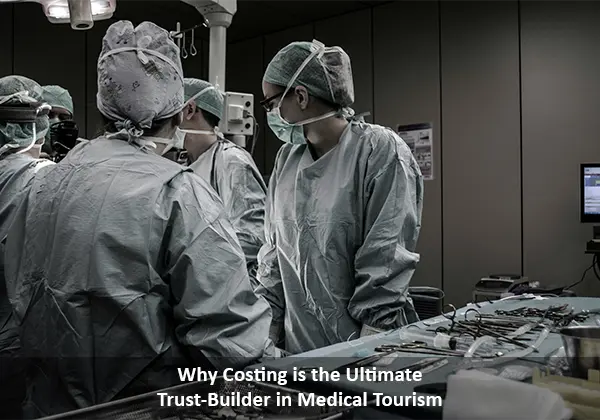Drawing from The Times of India editorial (November 5, 2025), India’s medical tourism market is poised to hit $58 billion with about 2 million medical tourists by 2035. However, this growth is threatened by patient distrust regarding overcharging, fragmented care, and poor follow-up. Proactive Solutech presents a strategic fix.
The Core Crisis: Trust vs. Transparency
India’s primary appeal—cost-effectiveness—is being damaged by a lack of transparency. International patients, accustomed to detailed billing, perceive opaque charges as “overcharging.” This perception is a direct result of poor internal cost accounting.
To capture the high-margin Medical Value Tourism (MVT) patient, hospitals must move beyond simple discount pricing and build an edifice of unquestionable financial transparency.
The Next Steps: Rebuilding the MVT Value Chain
The industry must stop focusing only on the procedure. To attract high-margin Medical Value Tourism (MVT) patients, hospitals must fix the entire, currently fragmented patient journey.
a) Fixing Fragmented Care (Logistics & Continuity)
Fragmented logistics create a patient nightmare and lead to “poor follow-up” complaints.
- Integrated Packages: Create dedicated MVT packages offering one transparent price covering visa, travel, accommodation, hospital stay, and all necessary follow-up.
- Dedicated MVT Teams: Establish specialized MVT Patient Experience teams as the single point of contact for logistics and language support, ensuring a seamless, premium experience.
- Digital Follow-up: Combat poor follow-up using technology. Mandate robust telemedicine and remote monitoring for $6-12$ months post-surgery to build trust and ensure long-term outcomes.
B) Rebuilding Ethical Trust
International patients demand global ethical standards. Uncertainty regarding “overcharging” or “unnecessary procedures” is a serious deterrent.
- Accreditation Mandate: Use NABH or JCI accreditation as the non-negotiable minimum to signal adherence to global clinical standards.
- Transparent Reporting: Publicly publish global quality metrics (like infection and re-admission rates) on your MVT website. Honesty builds credibility.
- Independent Review: Partner with third-party agencies to allow independent review of complex procedure pricing and clinical justification, eliminating ethical doubt.
The Ultimate Fix: Costing as a Trust-Builder (The Proactive Edge)
You cannot set a credible price if you do not know your true cost. The perception of “overcharging” is a costing failure, not a pricing failure.
a) Embrace Time-Driven-Activity-Based Costing (TDABC)
Hospitals must abandon arbitrary, competitor-based pricing. Implement Time-Driven-Activity-Based Costing (TDABC) to calculate the true, granular cost of every service provided to a medical tourist.
- Transparency Tool: ABC allows you to justify every rupee spent. You can precisely itemize components like: cost of the implant, minutes of surgeon time, cost of the dedicated MVT nurse, and cost of one ICU bed-day (including utilities and depreciation).
- Value Justification: By demonstrating the detailed cost, you shift the patient’s focus from the price tag to the value delivered. This justifies why your service is better than a lower-cost competitor.
- Accurate Profit Capture: ABC ensures that MVT packages—which should carry a healthy margin—are priced to maximize legitimate profit without crossing the line into price gouging.
b) Strategic Pricing for Global Competitiveness
Use your ABC data to set prices strategically:
- All-Inclusive Pricing: Stop itemized billing. Offer fixed, all-inclusive packages (e.g., “Full Knee Replacement Package”) that cover everything a patient needs from arrival to $6$ months post-care. This eliminates the patient’s fear of “surprise bills.”
- Global Benchmarking: Use your true cost (determined by ABC) as the floor. Set the final price by benchmarking it against the target patient’s home market, ensuring the cost remains 40% to 70% lower than their domestic price while retaining a strong margin for your hospital.
- Value-Chain Costing: Incorporate the cost of non-clinical, trust-building services (visa, interpreters, recovery housing) into the package. Present the patient with a single, compelling total value proposition.
Lead with Data, Win with Trust
India’s future as a medical tourism superpower depends on operational excellence and financial ethics. Fragmented care and distrust are symptoms of a flawed system. By implementing robust, globally credible costing (TDABC) and integrating it with an outstanding, seamless patient experience, Indian hospitals can not only realize the 58 billion and 2 Million medical tourists potential but also establish themselves as leaders in high-value, high-trust global healthcare. Costing transparency is your ultimate competitive advantage.
